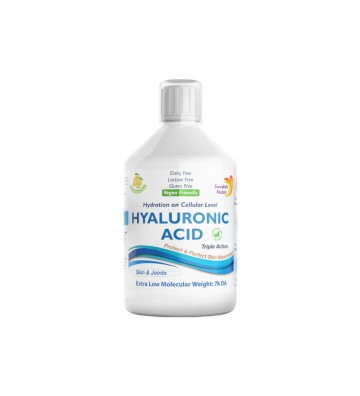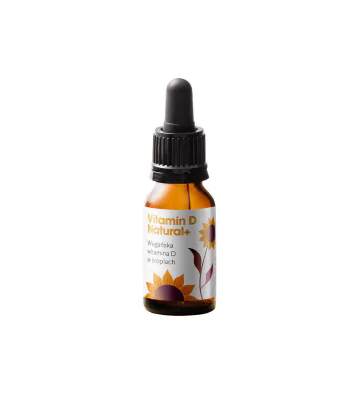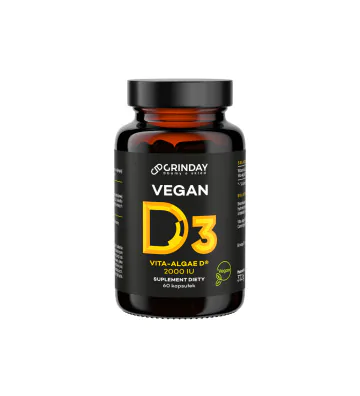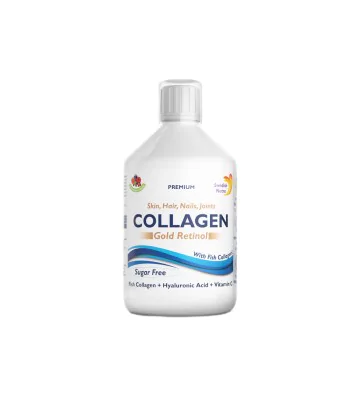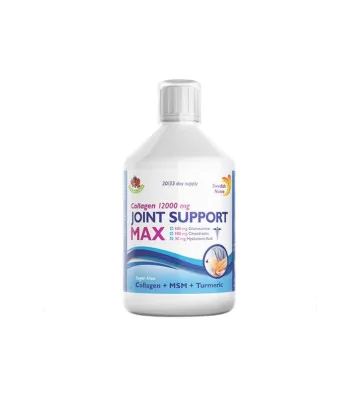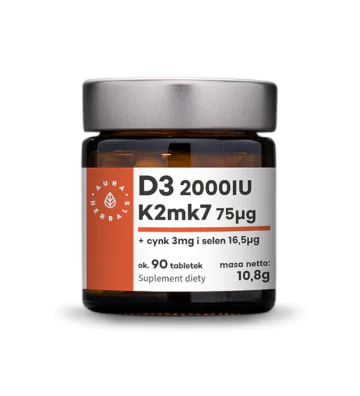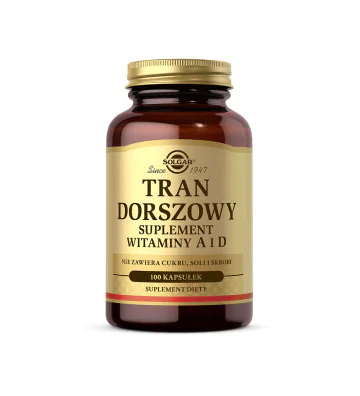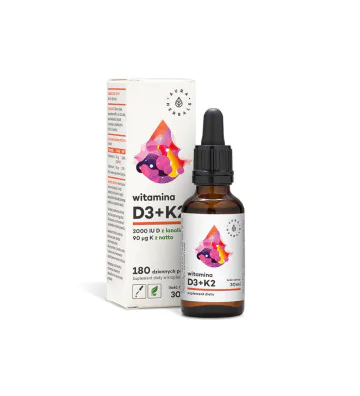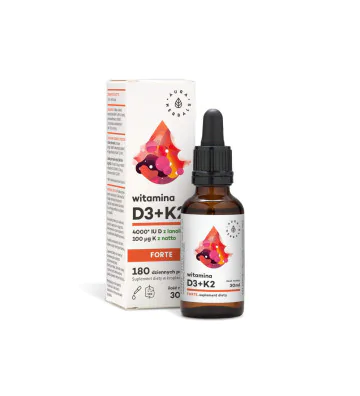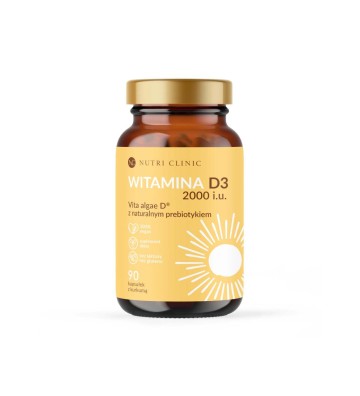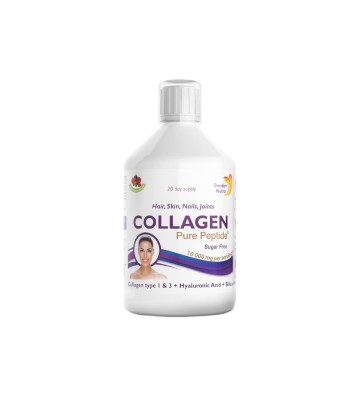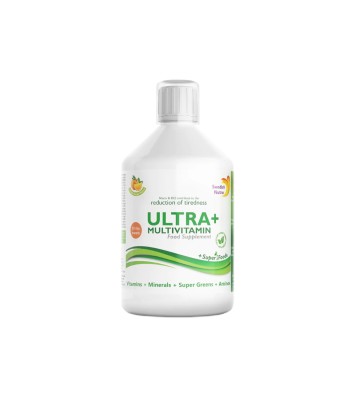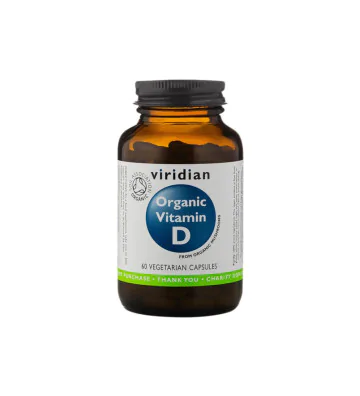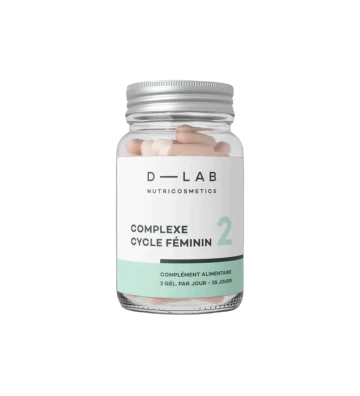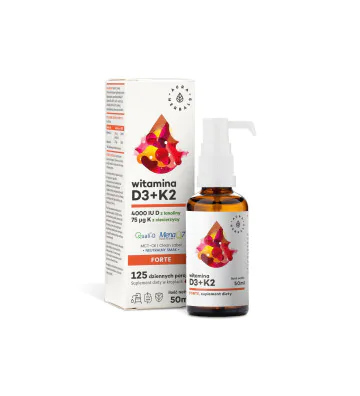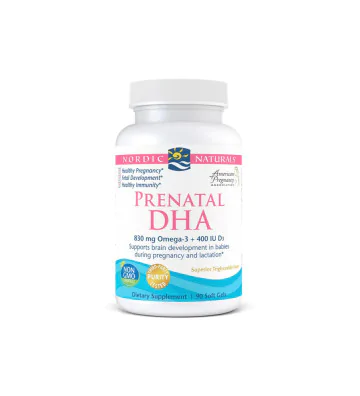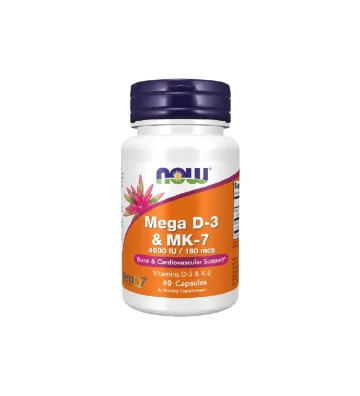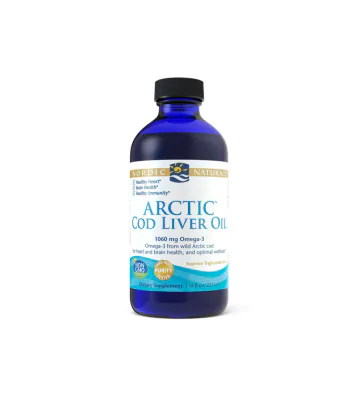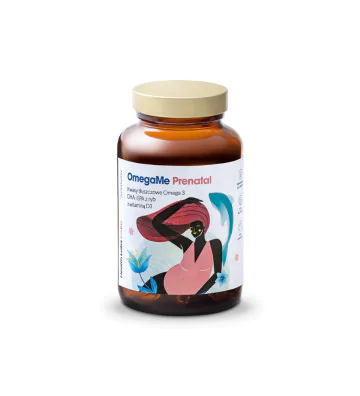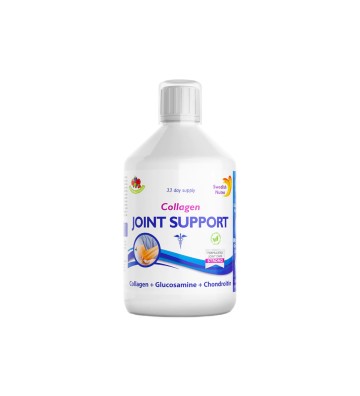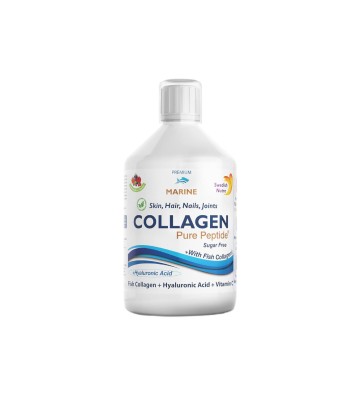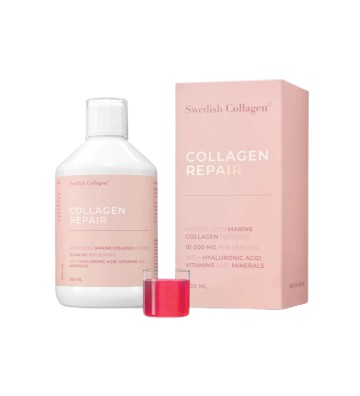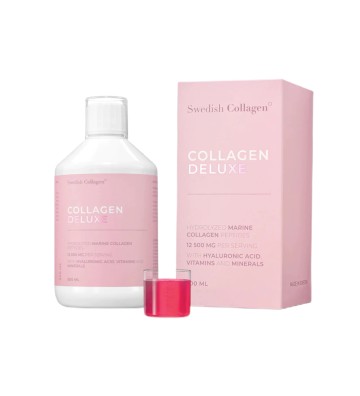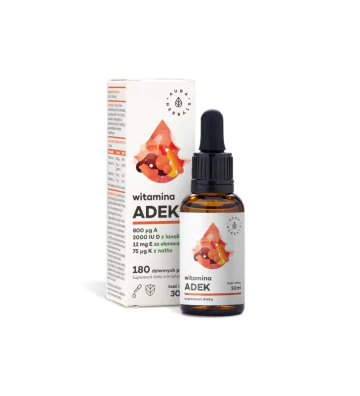UP TO 60% OFF SUMMER SALE
-
WOMEN
add remove
- All >>
-
Supplements
add remove
- All >>
- New
- Bestsellers
- Special offers
- Ashwagandha
- Colostrum
- Collagen
- Omega 3-6-9 acids
- Magnesium
- Vitamin C
- Vitamin D
- Kwas hialuronowy
- Amino Acids
- Anti-Aging
- Pregnancy and lactation
- Detox
- Energy
- Fit & Sport
- Medicinal mushrooms
- Bones and joints
- Fatty acids
- Brain, Memory, Concentration
- Functional beverages
- Eyes
- Weight loss and diet
- Resistance
- Nails
- Dream
- Leather
- Inflammation
- Stress
- Superfood
- Digestion
- Urinary system
- Liver
- Hair
- Vitamins and minerals
- Hormonal support
- Bestsellers
- Collagen
- Colostrum
- Gift cards
- Gift sets
-
MEN
add remove
-
Supplements
add remove
- All >>
- New
- Bestsellers
- Special offers
- Ashwagandha
- Colostrum
- Collagen
- Omega 3-6-9 acids
- Magnesium
- Vitamin C
- Vitamin D
- Amino Acids
- Anti-Aging
- Detox
- Energy
- Fit & Sport
- Medicinal mushrooms
- Bones and joints
- Fatty acids
- Brain, Memory, Concentration
- Functional beverages
- Eyes
- Resistance
- Nails
- Dream
- Cardiovascular
- Leather
- Inflammation
- Stress
- Superfood
- Digestion
- Urinary system
- Digestive system
- Liver
- Hair
- Vitamins and minerals
- Hormonal support
- Bestsellers
- Collagen
- Colostrum
- Probiotics
- Weight loss and diet
- Collagen
- Colostrum
- Gift cards
- Gift sets
-
Cosmetics
add remove
- All >>
- New
- Bestsellers
- Special offers
- Aromatherapy
- Body and bath
- Hands
- Oral cavity
- Tanning
- Intimate hygiene
- Feet
- Face
- Hair
- Bath cosmetics
- Hair care cosmetics
- Hair Styling
- Hand creams
- Natural
- Facial cosmetics
- Essential oils
- Beard care
- Intimate hygiene
- Deodorants and antiperspirants
- Cosmetics kits
- Against wrinkles
- Gift cards
- Gift sets
-
CHILDREN
add remove
-
Supplements
add remove
- All >>
- New
- Bestsellers
- Back to School
- Special offers
- Colostrum
- Omega 3-6-9 acids
- Magnesium
- Vitamin C
- Vitamin D
- Pregnancy and lactation
- Bones and joints
- Fatty acids
- Brain, Memory, Concentration
- Eyes
- Resistance
- Dream
- Digestion
- Digestive system
- Vitamins and minerals
- Bestsellers
- Colostrum
- Gift cards
- Gift sets
- Accessories add remove
- COLLAGEN
-
BRANDS
add remove
- MOST POPULAR add remove
- SUMMER SALE
Search for
- All
- Product
- Brand
Free delivery

SHIPPING TODAY!
Order within:
01
h44
min40
sec
Shipping next business day
0 items
0.00 zł
Total
0.00 zł
Blog navigation

What are the risks of excess vitamin D in the body?
Posted on:
2025-02-06
Table of contents
The properties and benefits of taking the so-called "sunshine vitamin" are known to more and more people. And good luck, because it is one of the most important vitamins for our body. Unfortunately, its deficiency is still a common problem in Poland, where sunshine tends to be scarce. However, there are also increasing questions about the other side of the coin - is excess vitamin D harmful? Interestingly, an excess of this vitamin can be just as dangerous as a deficiency. How does an overdose occur? What are the symptoms? How to get rid of excess vitamin D? Rest assured, we will answer all your questions.
Why is vitamin D3 so important for the body?
Vitamin D has many tasks in our body. First and foremost, however, it supports calcium-phosphate metabolism, so that bones can be properly formed and mineralized. It is what makes the body absorb calcium from food and use it to build strong bones and teeth. A deficiency can therefore lead to a weakened skeletal system, and rickets in children. However, this vitamin is also responsible for the immune system - it reduces the risk of infections and soothes inflammatory processes in the body. It also affects the health of the muscles and nervous system, and may even play a role in preventing depression and autoimmune diseases [1].
The body is able to synthesize vitamin D on its own, but only if it has access to sufficient sunlight. In our latitude, this is possible in summer, but in autumn and winter, and sometimes in spring, supplementation is necessary. Knowing the need for vitamin D is therefore essential to avoid overdosing.


What is the need for vitamin D?
Much depends on your age, health, lifestyle, and the moment in life you are currently in. Adults should consume between 800 and 2,000 units per day. However, older people, pregnant women or those struggling with excess weight may need higher doses. For people over the age of 75, the dose of vitamin D is 4,000 IU (100 µg) per day according to the 2021 GIS recommendations, which state the maximum daily dose of vitamin D in dietary supplements. These recommendations are based on current scientific knowledge and are intended to ensure the safety and effectiveness of vitamin D supplementation.
However, it is worthwhile to determine the consumption of vitamin D supplements individually with your doctor based on blood tests. Its optimal level in the body is 30-50 ng/ml. Levels above 100ng/ml can signal an excess of vitamin D.
Excess vitamin D - can you overdose on vitamin D?
Vitamin D overdose, or so-called hypervitaminosis D, is as possible. However, it occurs rarely, which is worth keeping in mind. First of all, remember that the natural synthesis of this vitamin in the skin - even with prolonged sun exposure - does not lead to an overdose. The body regulates its production on its own. What causes an excess of vitamin D? The problem can arise during supplementation and exceeding the safe doses recommended by the manufacturer or doctor. How can this happen? For example, when you supplement various preparations that contain vitamin D. Supplementation by stockpiling can also contribute - when you think that taking several doses of a supplement one day won't hurt you at all. Remember that the recommendations on the package are there for a reason. It is not worth deciding to change them on your own.


Excess vitamin D - symptoms to watch out for
The effects of excess vitamin D can be quite inconspicuous - initially there is weakness, headache or fatigue. They can easily be mistaken for an impending cold. However, over time, excess vitamin D can cause serious problems.
Hypercalcemia is one of the consequences of excess vitamin D. Because it increases the absorption of calcium in the intestines, the body gets too much of it, leading to a condition in which blood calcium levels are too high. This can be associated with muscle and joint pain, for example. This is because calcium is deposited in soft tissues.
- What is excess vitamin D associated with? Neurological symptoms, such as irritability, confusion or even memory problems, can occur due to elevated calcium levels in the blood. It directly affects nerve cells, interfering with their functioning. Disruption of nerve impulse conduction, increased excitability of nerve cells - this is an advanced state of hypercalcemia, but as possible.
- What else is affected by excess vitamin D? Hair loss is another symptom that is associated with mineral imbalance in the body.
- Stomach problems, including abdominal pain, diarrhea and vomiting.
- Damage to the kidneys and, in extreme cases, even kidney failure - this is one of the effects that arise with long-term excess vitamin D.
It is worth remembering that these are not problems that arise overnight. However, excess vitamin D can lead to serious consequences. Not only in adults, but also in children, who are even more vulnerable to mineral imbalances.
Excess vitamin D - symptoms in children
Vitamin D overdose can occur even more so in children, who need much smaller doses of the vitamin than adults. Incorrect supplementation leads to:
Lack of appetite, nausea and vomiting, and abdominal pains
Neurological problems such as irritability, weakness, lethargy and impaired concentration.
Development and growth disorders. This is one of the biggest risks associated with vitamin D overdose in children. It can lead to bone deformities, stunted growth and problems with tooth eruption.
Development and growth disorders. This is one of the biggest risks associated with vitamin D overdose in children. It can lead to bone deformities, stunted growth and problems with tooth eruption.
How else does an excess of vitamin D manifest itself? A rash is another symptom that should be alarming. Other changes, such as excessive sweating or dehydration associated with frequent urination, should prompt parents to see a doctor right away [2].
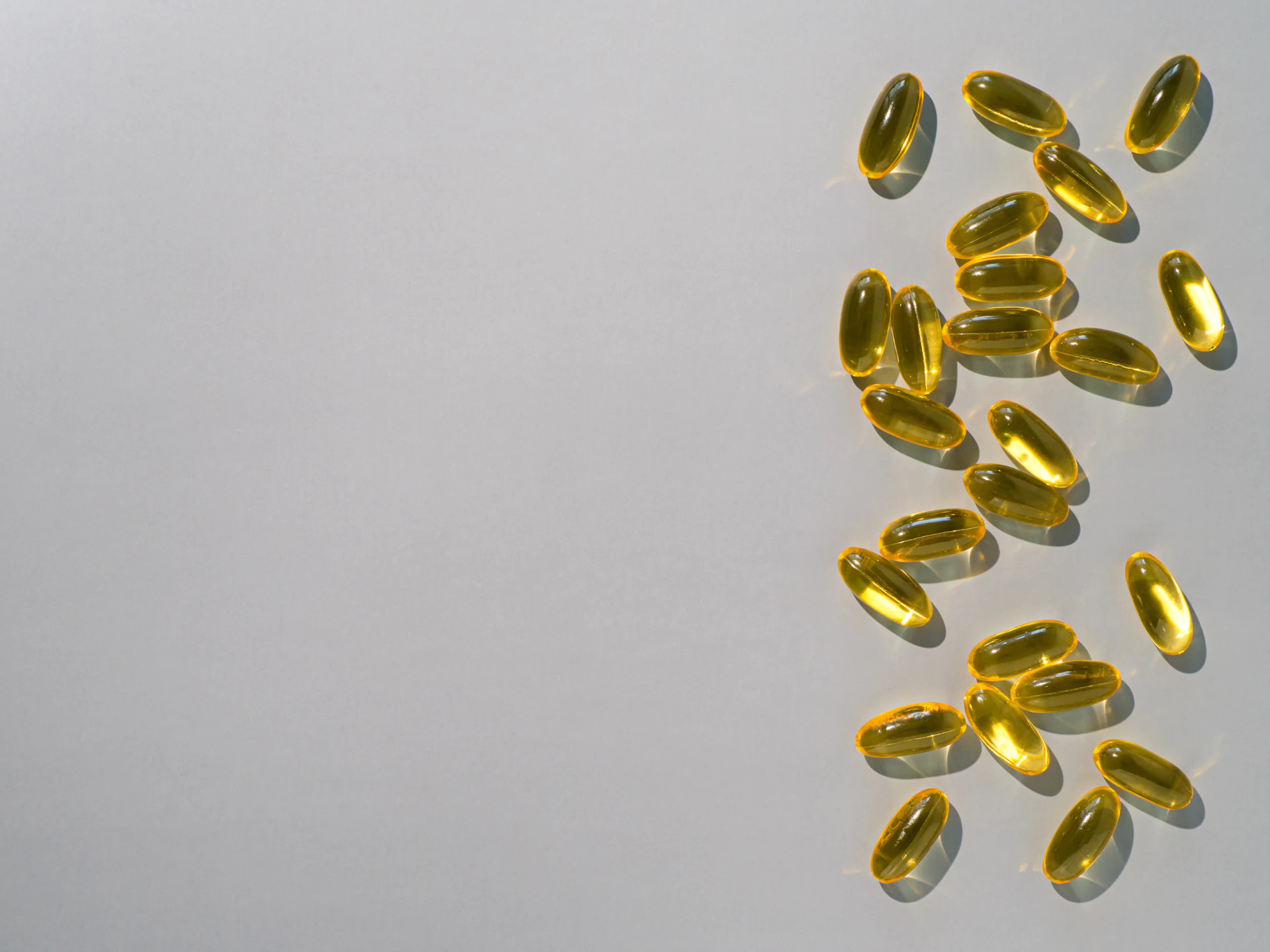

Excess vitamin D in pregnancy
During pregnancy, the need for vitamins and minerals increases significantly, and vitamin D supplementation is recommended to support both the health of mom and the developing baby. Keep in mind, however, that excess vitamin D during pregnancy can be just as harmful as vitamin D deficiency. Too high doses lead to hypercalcemia, which can result in complications such as high blood pressure and kidney problems. In the fetus, meanwhile, excess vitamin D can interfere with bone development and lead to skeletal deformities. Therefore, be sure to consult your doctor before starting supplementation. It's also a good idea to monitor vitamin D levels in the blood.
How to treat vitamin D poisoning?
If tests indicate too high levels of vitamin D and an overdose of vitamin D, it is necessary to consult a doctor. Treatment of hypervitaminosis D mainly consists of discontinuing supplementation - immediately, so that the body begins to clear it. The doctor may also recommend IV fluids, corticosteroids or bisphosphonates to reduce hypercalcemia, that is, lower calcium levels in the blood. Regular blood tests will indicate whether vitamin D and calcium levels in the body are decreasing. Keep in mind that with mild symptoms, such as headaches or rashes, they may resolve on their own after supplements are discontinued. In more severe cases, treatment may require hospitalization.
If you notice alarming symptoms in yourself, such as a rash, headaches, or hair loss - don't delay consultation. A blood test will quickly show whether this is the result of a vitamin D overdose. Remember that our body needs balance first and foremost, including vitamin balance. Therefore, always exercise caution when supplementing.
Source
Related products
MyBestOmega-3 dietary supplement 120 capsules
Price: 169.90 zł
Great power in a daily dose - this is a supplement with the richest content...
Hyaluronic Acid - Dietary supplement with hyaluronic acid 500 ml
Price: 65.00 zł
Dietary supplement with hyaluronic acid
Supports healthy skin condition....
Dietary supplement Living Multivitamin Man
Price: 159.90 zł
A proven supplement for men for immunity and potency.
Contributes to...
copy of Women's Multivitamin - Dietary supplement multivitamin for women 60 pcs.
Old price: 45.00 zł
Price: 40.50 zł
Discount: 10%
Save up: -4.50 zł
Sweet support for well-being, health and vitality
Supports immunity and...
Vitamin D Natural+ dietary supplement 9.9 ml
Old price: 65.00 zł
Price: 57.20 zł
Discount: 12%
Save up: -7.80 zł
Vegan vitamin D3 drops
Vitamin D3 from algae, dissolved in MCT oil,
50 µg...
Vitamin D-3 1000 IU. Extra - drops for adults 30ml
Old price: 36.00 zł
Price: 32.40 zł
Discount: 10%
Save up: -3.60 zł
Strengthen your bones and muscles with vitamin D-3
1,000 IU in 1 drop...
Grinday Vegan D3 - Vegan vitamin D3 60 pcs.
Old price: 69.90 zł
Price: 62.91 zł
Discount: 10%
Save up: -6.99 zł
Commonly known vitamin D3 in a vegan version
Contributes to the...
Vitamin D3, plant forms, 90 capsules
Old price: 69.00 zł
Price: 48.30 zł
Discount: 30%
Save up: -20.70 zł
Nani Vitamin D3 in plant form
Contributes to the absorption of calcium...
Vitamin D3 + K2 - Dietary supplement 60 pcs.
Old price: 93.00 zł
Price: 83.70 zł
Discount: 10%
Save up: -9.30 zł
Sunshine enclosed in a bottle - for strong bones.
Supports the functioning...
copy of Collagen 10,000 mg Marine- Dietary supplement with collagen 500 ml
Price: 109.00 zł
Dietary supplement containing hydrolyzed fish collagen
Supports firm skin,...
copy of Collagen Joint Support - Dietary supplement with collagen 500 ml.
Price: 85.00 zł
Dietary supplement with collagen
Improves joint structure with hydrolyzed...
Vitamin D3 2000 IU + K2 MK7+ Zinc + Selenium, tablets approx. 90 pcs.
Old price: 29.90 zł
Price: 28.41 zł
Discount: 5%
Save up: -1.50 zł
Why choose Vitamin D3 + K2 MK7 + Zinc + Selenium by Aura Herbals?
Natural...
Vegan D3, Vitamin C & Zink
Old price: 110.00 zł
Price: 88.00 zł
Discount: 20%
Save up: -22.00 zł
A combination of highly bioavailable minerals to support your immunity
50...
Vitamin D3 2000 IU FORTE, MCT, drops 50ml
Old price: 29.90 zł
Price: 28.41 zł
Discount: 5%
Save up: -1.50 zł
Why choose Vitamin D3 Forte MCT-Oil by Aura Herbals?
100% natural...
copy of Ultra+ Multivitamin - Multivitamin for immune support 500 ml.
Price: 55.00 zł
Liquid multivitamin
A unique formula with more than 60 active ingredients....
copy of Ultra+ Multivitamin - Multivitamin for immune support 500 ml.
Price: 75.00 zł
Liquid multivitamin
A unique formula with more than 60 active ingredients....
Cod cod liver oil 100 capsules
Old price: 45.00 zł
Price: 33.75 zł
Discount: 25%
Save up: -11.25 zł
Each capsule is guaranteed to give you a dose of vitamins A and D, as well as...
Vitamin D3 2000 IU + K2 MK7, drops 30ml
Old price: 39.90 zł
Price: 37.91 zł
Discount: 5%
Save up: -2.00 zł
Why choose Vitamin D3 + K2 MK7 by Aura Herbals?
100% natural ingredients,...
Vitamin D3 4000 IU + K2 MK7 FORTE, drops 30ml
Old price: 45.90 zł
Price: 43.61 zł
Discount: 5%
Save up: -2.30 zł
Why choose Vitamin D3 4000 IU + K2 MK7 FORTE by Aura Herbals?
100% natural...
Omega-3D Dietary Supplement, 1560mg Lemon - 237ml
Old price: 140.00 zł
Price: 112.00 zł
Discount: 20%
Save up: -28.00 zł
The bestseller among Omega-3 acids with the addition of vitamin D3.
Ideal...
Vitamin D3 from algae 90 capsules
Old price: 74.00 zł
Price: 59.20 zł
Discount: 20%
Save up: -14.80 zł
Natural vitamin D3 from algae
2000 i.u. per capsule
Enriched with inulin...
Collagen 10,000 mg Bovine - Dietary supplement with collagen 500 ml
Price: 75.00 zł
Dietary supplement containing hydrolyzed bovine collagen
Supports firm...
copy of Vitamin D3 + K2 - Dietary supplement 60 pcs.
Old price: 45.00 zł
Price: 40.50 zł
Discount: 10%
Save up: -4.50 zł
Sunshine enclosed in a bottle - for strong bones.
Supports the functioning...
Ultra+ Multivitamin - Multivitamin for immune support 500 ml.
Price: 75.00 zł
Liquid multivitamin
A unique formula with more than 60 active ingredients....
Organic Vitamin D 60 pcs.
Old price: 89.00 zł
Price: 57.85 zł
Discount: 35%
Save up: -31.15 zł
Ensure immunity and healthy bones
Vitamin D2 derived from Agaricus...
Dietary supplement UP D3+
Price: 39.99 zł
Health support.
100 µg/ 4000 IU vitamin D3 in 1 capsule,
60 days of use...
Hormonal Balance Complex 56 plant capsules.
Price: 142.00 zł
Experience a good menstrual cycle.
Improves mood and boosts energy....
Vitamin D3 4000 IU, MCT, drops 50ml
Old price: 31.90 zł
Price: 30.31 zł
Discount: 5%
Save up: -1.60 zł
Why choose Vitamin D3 4000 IU, MCT by Aura Herbals?
100% natural...
Dietary supplement Garlic Long Plus 120 pcs.
Old price: 115.00 zł
Price: 103.50 zł
Discount: 10%
Save up: -11.50 zł
Dietary supplement with natural garlic extract.
Contributes to lowering...
Vitamin D3 2000 IU FORTE, drops 30ml
Old price: 19.90 zł
Price: 18.91 zł
Discount: 5%
Save up: -1.00 zł
Why choose Vitamin D3 Forte by Aura Herbals?
100% natural ingredients,...
Vitamin D3 4000 IU + K2 MK7, MCT, drops 50ml
Old price: 51.90 zł
Price: 49.31 zł
Discount: 5%
Save up: -2.60 zł
Why choose Vitamin D3 4000 IU + K2 MK7, MCT drops from Aura Herbals?
100%...
BestOne 60 pcs.
Price: 109.00 zł
BestOne to guard immunity
Support for the immune system
Contains a...
Dietary supplement Prenatal DHA, 830 mg Omega-3 + 400 IU D3 - 90 soft capsules.
Old price: 143.00 zł
Price: 114.40 zł
Discount: 20%
Save up: -28.60 zł
Important nutrients for a developing baby and maintaining a healthy...
copy of Vitamin D-3 1000 IU for sucking 180 pcs.
Old price: 60.00 zł
Price: 54.00 zł
Discount: 10%
Save up: -6.00 zł
Provide your body with vitamin D-3 in the form of tasty lozenges
Helps...
Dietary supplement Arctic Cod Liver Oil, 1060 mg 237 ml
Old price: 144.00 zł
Price: 115.20 zł
Discount: 20%
Save up: -28.80 zł
Vitamin D3 added to the Norwegian classic - the fish oil that started it all....
OmegaMe Prenatal dietary supplement 60 pcs.
Old price: 129.00 zł
Price: 113.52 zł
Discount: 12%
Save up: -15.48 zł
Omega 3 DHA and EPA fatty acids from fish with vitamin D3
As much as 700...
Menopause Natural+ dietary supplement 60 pcs.
Old price: 99.00 zł
Price: 87.12 zł
Discount: 12%
Save up: -11.88 zł
For support of the body during menopause
Reduce hot flashes and excessive...
Original Spearmint 90 pcs.
Old price: 210.00 zł
Price: 178.50 zł
Discount: 15%
Save up: -31.50 zł
Cold-pressed cod liver oil in capsule form
Alleviates symptoms of anxiety...
Essentials 60 capsules
Price: 300.00 zł
A comprehensive dose of vitamins and minerals to support the body
Natural...
ProtectMe Recovery+ dietary supplement 30 pcs.
Price: 155.00 zł
When the body needs support
highly concentrated fruit extracts,...
SmartMe dietary supplement 250 ml
Price: 119.00 zł
For better skin condition
Supports skin health and condition
Protects...
Mandarin 170 ml
Price: 215.00 zł
Cold-pressed cod liver oil with Mandarin flavor
Alleviates symptoms of...
NewMe dietary supplement 2 x 30 pcs.
Price: 169.00 zł
For better condition of skin, hair and nails
A source of highly absorbable...
Collagen Joint Support - Dietary supplement with collagen 500 ml.
Price: 79.00 zł
Dietary supplement with collagen
Improves joint structure with hydrolyzed...
Collagen 10,000 mg Marine- Dietary supplement with collagen 500 ml
Price: 89.00 zł
Dietary supplement containing hydrolyzed fish collagen
Supports firm skin,...
Marine Beauty - Dietary supplement with collagen 20 pcs.
Price: 119.00 zł
Hydrolyzed fish collagen types I and III in ampoules
Provides a specially...
Joint Shots - Dietary supplement with collagen 20 pcs.
Price: 119.00 zł
Berry-flavored collagen ampoules
Provide a specially formulated blend of...
Dietary supplement Living Multinutrient Complex
Price: 149.90 zł
Vegan supplement for energy and beautiful hair, skin and nails....
Dietary supplement Living Multivitamin Sport
Price: 149.90 zł
A complex of vitamins and supplements for energy for athletes.
Supports...
Dietary supplement Prenatal Multivitamin Complex
Price: 119.90 zł
Selected complex of supplements for pregnant women.
Supports the nervous...
Collagen Repair 500 ml
Old price: 169.00 zł
Price: 135.20 zł
Discount: 20%
Save up: -33.80 zł
Formulated to increase collagen levels in the body and prevent wrinkles...
Collagen Vegan 500 ml
Old price: 169.00 zł
Price: 135.20 zł
Discount: 20%
Save up: -33.80 zł
Fully vegan. Formulated to prevent wrinkles
10,000 mg of vegan amino...
Collagen Deluxe 500 ml
Old price: 189.00 zł
Price: 151.20 zł
Discount: 20%
Save up: -37.80 zł
Formulated to prevent wrinkles
12,500 mg of hydrolyzed liquid marine...
2-PHASE SKIN-SHAPING KIT 60 capsules
Old price: 333.00 zł
Price: 233.10 zł
Discount: 30%
Save up: -99.90 zł
MEET 2 PHASE SKIN SMOOTHING KIT FROM YLUMI
Provide brightening of the skin...
Spearmint 170 ml
Price: 215.00 zł
Cold-pressed cod liver oil with mint flavor
Alleviates symptoms of anxiety...
Vitamin ADEK, A + D3 2000 IU + E + K2, drops 30ml
Price: 49.90 zł
Why choose Vitamin "ADEK" by Aura Herbals?
Natural source of vitamin D...
copy of Rapid Cleanse
Price: 89.00 zł
A 7-day intensive detox to kick-start a healthy life
Two doses composed...
Hair Skin & Nails - Dietary supplement for hair, skin and nails 500 ml.
Price: 69.00 zł
A dietary supplement that cares for the health of skin, hair and nails.
A...
OmegaMe Vege dietary supplement 60 pcs.
Price: 139.00 zł
Omega 3 DHA fatty acids from marine algae with vitamin D3
A plant-based...
copy of Pro-Collagen - Slimming
Price: 330.00 zł
Breaks down fat, smooths the body.
Anti-cellulite action.
Provides...
MyBestOmega-3 dietary supplement 120 capsules
Price: 169.90 zł
Great power in a daily dose - this is a supplement with the richest content...
Hyaluronic Acid - Dietary supplement with hyaluronic acid 500 ml
Price: 65.00 zł
Dietary supplement with hyaluronic acid
Supports healthy skin condition....
Dietary supplement Living Multivitamin Man
Price: 159.90 zł
A proven supplement for men for immunity and potency.
Contributes to...
copy of Women's Multivitamin - Dietary supplement multivitamin for women 60 pcs.
Old price: 45.00 zł
Price: 40.50 zł
Discount: 10%
Save up: -4.50 zł
Sweet support for well-being, health and vitality
Supports immunity and...
Vitamin D Natural+ dietary supplement 9.9 ml
Old price: 65.00 zł
Price: 57.20 zł
Discount: 12%
Save up: -7.80 zł
Vegan vitamin D3 drops
Vitamin D3 from algae, dissolved in MCT oil,
50 µg...
Vitamin D-3 1000 IU. Extra - drops for adults 30ml
Old price: 36.00 zł
Price: 32.40 zł
Discount: 10%
Save up: -3.60 zł
Strengthen your bones and muscles with vitamin D-3
1,000 IU in 1 drop...
Grinday Vegan D3 - Vegan vitamin D3 60 pcs.
Old price: 69.90 zł
Price: 62.91 zł
Discount: 10%
Save up: -6.99 zł
Commonly known vitamin D3 in a vegan version
Contributes to the...
Vitamin D3, plant forms, 90 capsules
Old price: 69.00 zł
Price: 48.30 zł
Discount: 30%
Save up: -20.70 zł
Nani Vitamin D3 in plant form
Contributes to the absorption of calcium...
Vitamin D3 + K2 - Dietary supplement 60 pcs.
Old price: 93.00 zł
Price: 83.70 zł
Discount: 10%
Save up: -9.30 zł
Sunshine enclosed in a bottle - for strong bones.
Supports the functioning...
copy of Collagen 10,000 mg Marine- Dietary supplement with collagen 500 ml
Price: 109.00 zł
Dietary supplement containing hydrolyzed fish collagen
Supports firm skin,...
copy of Collagen Joint Support - Dietary supplement with collagen 500 ml.
Price: 85.00 zł
Dietary supplement with collagen
Improves joint structure with hydrolyzed...
Vitamin D3 2000 IU + K2 MK7+ Zinc + Selenium, tablets approx. 90 pcs.
Old price: 29.90 zł
Price: 28.41 zł
Discount: 5%
Save up: -1.50 zł
Why choose Vitamin D3 + K2 MK7 + Zinc + Selenium by Aura Herbals?
Natural...
Vegan D3, Vitamin C & Zink
Old price: 110.00 zł
Price: 88.00 zł
Discount: 20%
Save up: -22.00 zł
A combination of highly bioavailable minerals to support your immunity
50...
Vitamin D3 2000 IU FORTE, MCT, drops 50ml
Old price: 29.90 zł
Price: 28.41 zł
Discount: 5%
Save up: -1.50 zł
Why choose Vitamin D3 Forte MCT-Oil by Aura Herbals?
100% natural...
copy of Ultra+ Multivitamin - Multivitamin for immune support 500 ml.
Price: 55.00 zł
Liquid multivitamin
A unique formula with more than 60 active ingredients....
copy of Ultra+ Multivitamin - Multivitamin for immune support 500 ml.
Price: 75.00 zł
Liquid multivitamin
A unique formula with more than 60 active ingredients....
Cod cod liver oil 100 capsules
Old price: 45.00 zł
Price: 33.75 zł
Discount: 25%
Save up: -11.25 zł
Each capsule is guaranteed to give you a dose of vitamins A and D, as well as...
Vitamin D3 2000 IU + K2 MK7, drops 30ml
Old price: 39.90 zł
Price: 37.91 zł
Discount: 5%
Save up: -2.00 zł
Why choose Vitamin D3 + K2 MK7 by Aura Herbals?
100% natural ingredients,...
Vitamin D3 4000 IU + K2 MK7 FORTE, drops 30ml
Old price: 45.90 zł
Price: 43.61 zł
Discount: 5%
Save up: -2.30 zł
Why choose Vitamin D3 4000 IU + K2 MK7 FORTE by Aura Herbals?
100% natural...
Omega-3D Dietary Supplement, 1560mg Lemon - 237ml
Old price: 140.00 zł
Price: 112.00 zł
Discount: 20%
Save up: -28.00 zł
The bestseller among Omega-3 acids with the addition of vitamin D3.
Ideal...
Vitamin D3 from algae 90 capsules
Old price: 74.00 zł
Price: 59.20 zł
Discount: 20%
Save up: -14.80 zł
Natural vitamin D3 from algae
2000 i.u. per capsule
Enriched with inulin...
Collagen 10,000 mg Bovine - Dietary supplement with collagen 500 ml
Price: 75.00 zł
Dietary supplement containing hydrolyzed bovine collagen
Supports firm...
copy of Vitamin D3 + K2 - Dietary supplement 60 pcs.
Old price: 45.00 zł
Price: 40.50 zł
Discount: 10%
Save up: -4.50 zł
Sunshine enclosed in a bottle - for strong bones.
Supports the functioning...
Ultra+ Multivitamin - Multivitamin for immune support 500 ml.
Price: 75.00 zł
Liquid multivitamin
A unique formula with more than 60 active ingredients....
Organic Vitamin D 60 pcs.
Old price: 89.00 zł
Price: 57.85 zł
Discount: 35%
Save up: -31.15 zł
Ensure immunity and healthy bones
Vitamin D2 derived from Agaricus...
Dietary supplement UP D3+
Price: 39.99 zł
Health support.
100 µg/ 4000 IU vitamin D3 in 1 capsule,
60 days of use...
Hormonal Balance Complex 56 plant capsules.
Price: 142.00 zł
Experience a good menstrual cycle.
Improves mood and boosts energy....
Vitamin D3 4000 IU, MCT, drops 50ml
Old price: 31.90 zł
Price: 30.31 zł
Discount: 5%
Save up: -1.60 zł
Why choose Vitamin D3 4000 IU, MCT by Aura Herbals?
100% natural...
Dietary supplement Garlic Long Plus 120 pcs.
Old price: 115.00 zł
Price: 103.50 zł
Discount: 10%
Save up: -11.50 zł
Dietary supplement with natural garlic extract.
Contributes to lowering...
Vitamin D3 2000 IU FORTE, drops 30ml
Old price: 19.90 zł
Price: 18.91 zł
Discount: 5%
Save up: -1.00 zł
Why choose Vitamin D3 Forte by Aura Herbals?
100% natural ingredients,...
Vitamin D3 4000 IU + K2 MK7, MCT, drops 50ml
Old price: 51.90 zł
Price: 49.31 zł
Discount: 5%
Save up: -2.60 zł
Why choose Vitamin D3 4000 IU + K2 MK7, MCT drops from Aura Herbals?
100%...
BestOne 60 pcs.
Price: 109.00 zł
BestOne to guard immunity
Support for the immune system
Contains a...
Dietary supplement Prenatal DHA, 830 mg Omega-3 + 400 IU D3 - 90 soft capsules.
Old price: 143.00 zł
Price: 114.40 zł
Discount: 20%
Save up: -28.60 zł
Important nutrients for a developing baby and maintaining a healthy...
copy of Vitamin D-3 1000 IU for sucking 180 pcs.
Old price: 60.00 zł
Price: 54.00 zł
Discount: 10%
Save up: -6.00 zł
Provide your body with vitamin D-3 in the form of tasty lozenges
Helps...
Dietary supplement Arctic Cod Liver Oil, 1060 mg 237 ml
Old price: 144.00 zł
Price: 115.20 zł
Discount: 20%
Save up: -28.80 zł
Vitamin D3 added to the Norwegian classic - the fish oil that started it all....
OmegaMe Prenatal dietary supplement 60 pcs.
Old price: 129.00 zł
Price: 113.52 zł
Discount: 12%
Save up: -15.48 zł
Omega 3 DHA and EPA fatty acids from fish with vitamin D3
As much as 700...
Menopause Natural+ dietary supplement 60 pcs.
Old price: 99.00 zł
Price: 87.12 zł
Discount: 12%
Save up: -11.88 zł
For support of the body during menopause
Reduce hot flashes and excessive...
Original Spearmint 90 pcs.
Old price: 210.00 zł
Price: 178.50 zł
Discount: 15%
Save up: -31.50 zł
Cold-pressed cod liver oil in capsule form
Alleviates symptoms of anxiety...
Essentials 60 capsules
Price: 300.00 zł
A comprehensive dose of vitamins and minerals to support the body
Natural...
ProtectMe Recovery+ dietary supplement 30 pcs.
Price: 155.00 zł
When the body needs support
highly concentrated fruit extracts,...
SmartMe dietary supplement 250 ml
Price: 119.00 zł
For better skin condition
Supports skin health and condition
Protects...
Mandarin 170 ml
Price: 215.00 zł
Cold-pressed cod liver oil with Mandarin flavor
Alleviates symptoms of...
NewMe dietary supplement 2 x 30 pcs.
Price: 169.00 zł
For better condition of skin, hair and nails
A source of highly absorbable...
Collagen Joint Support - Dietary supplement with collagen 500 ml.
Price: 79.00 zł
Dietary supplement with collagen
Improves joint structure with hydrolyzed...
Collagen 10,000 mg Marine- Dietary supplement with collagen 500 ml
Price: 89.00 zł
Dietary supplement containing hydrolyzed fish collagen
Supports firm skin,...
Marine Beauty - Dietary supplement with collagen 20 pcs.
Price: 119.00 zł
Hydrolyzed fish collagen types I and III in ampoules
Provides a specially...
Joint Shots - Dietary supplement with collagen 20 pcs.
Price: 119.00 zł
Berry-flavored collagen ampoules
Provide a specially formulated blend of...
Dietary supplement Living Multinutrient Complex
Price: 149.90 zł
Vegan supplement for energy and beautiful hair, skin and nails....
Dietary supplement Living Multivitamin Sport
Price: 149.90 zł
A complex of vitamins and supplements for energy for athletes.
Supports...
Dietary supplement Prenatal Multivitamin Complex
Price: 119.90 zł
Selected complex of supplements for pregnant women.
Supports the nervous...
Collagen Repair 500 ml
Old price: 169.00 zł
Price: 135.20 zł
Discount: 20%
Save up: -33.80 zł
Formulated to increase collagen levels in the body and prevent wrinkles...
Collagen Vegan 500 ml
Old price: 169.00 zł
Price: 135.20 zł
Discount: 20%
Save up: -33.80 zł
Fully vegan. Formulated to prevent wrinkles
10,000 mg of vegan amino...
Collagen Deluxe 500 ml
Old price: 189.00 zł
Price: 151.20 zł
Discount: 20%
Save up: -37.80 zł
Formulated to prevent wrinkles
12,500 mg of hydrolyzed liquid marine...
2-PHASE SKIN-SHAPING KIT 60 capsules
Old price: 333.00 zł
Price: 233.10 zł
Discount: 30%
Save up: -99.90 zł
MEET 2 PHASE SKIN SMOOTHING KIT FROM YLUMI
Provide brightening of the skin...
Spearmint 170 ml
Price: 215.00 zł
Cold-pressed cod liver oil with mint flavor
Alleviates symptoms of anxiety...
Vitamin ADEK, A + D3 2000 IU + E + K2, drops 30ml
Price: 49.90 zł
Why choose Vitamin "ADEK" by Aura Herbals?
Natural source of vitamin D...
copy of Rapid Cleanse
Price: 89.00 zł
A 7-day intensive detox to kick-start a healthy life
Two doses composed...
Hair Skin & Nails - Dietary supplement for hair, skin and nails 500 ml.
Price: 69.00 zł
A dietary supplement that cares for the health of skin, hair and nails.
A...
OmegaMe Vege dietary supplement 60 pcs.
Price: 139.00 zł
Omega 3 DHA fatty acids from marine algae with vitamin D3
A plant-based...
copy of Pro-Collagen - Slimming
Price: 330.00 zł
Breaks down fat, smooths the body.
Anti-cellulite action.
Provides...
MyBestOmega-3 dietary supplement 120 capsules
Price: 169.90 zł
Great power in a daily dose - this is a supplement with the richest content...
Hyaluronic Acid - Dietary supplement with hyaluronic acid 500 ml
Price: 65.00 zł
Dietary supplement with hyaluronic acid
Supports healthy skin condition....
Dietary supplement Living Multivitamin Man
Price: 159.90 zł
A proven supplement for men for immunity and potency.
Contributes to...
copy of Women's Multivitamin - Dietary supplement multivitamin for women 60 pcs.
Old price: 45.00 zł
Price: 40.50 zł
Discount: 10%
Save up: -4.50 zł
Sweet support for well-being, health and vitality
Supports immunity and...
Related posts
 THEGLOOW.COM specialists
THEGLOOW.COM specialists
Posted in:
THEGLOOW.COM
2023-09-01
THEGLOOW.COM store is not just a place to shop. It's a space where experts in various fields co-create harmony of...
Read more
 Responsible supplementation - the key to individual success
Responsible supplementation - the key to individual success
Posted in:
Supplements
2023-09-14
Supplementation is a sphere of life that most of us are paying more and more attention to. Surveys indicate that more...
Read more
 A healthy lifestyle is a kind of balance. Agnieszka Woźniak-Starak
A healthy lifestyle is a kind of balance. Agnieszka Woźniak-Starak
2023-09-14
One of the biggest and most beautiful Polish celebrities, known from television, radio, and the Triangle - the...
Read more


